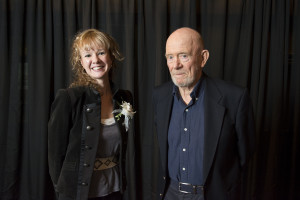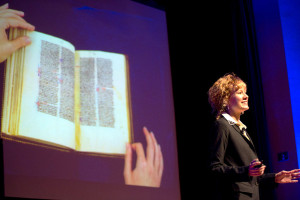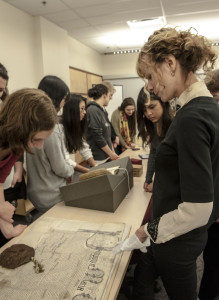Jamie Kemp is back in the news again. The busy History in Art and Medieval Studies PhD candidate was named one of three recipients of UVic’s Andy Farquharson Teaching Excellence Award for Graduate Students on February 6. Not that this is surprising for the 2012 TEDx Victoria alumna, who also just finished inspiring middle school students in her session for February’s Fresh Minds symposium here at UVic.
“Jamie is a gifted teacher who exemplifies the effective learning model, who is passionate about writing and who is a valued member of the History in Art Graduate Student community,” noted Dr. David Capson, Dean of Graduate Studies, in his award presentation. “Her students all attest that not only has she changed the way that they learn by fostering an open and collaborative environment free of boundaries, she also brings a sense of fun and excitement to whatever she is teaching.”
While only three recipients are selected to receive the Teaching Excellence Award, there were 16 nominations—so Kemp is indeed among the most outstanding Graduate Students here at UVic. She has participated in a number of teaching-related conferences and workshops over the past few years, including the 2012 Association of Learning Technology conference at the University of Manchester, and has led workshops for both UVic’s own Learning and Teaching Centre and the annual “Let’s Talk About Teaching at UVic” event. She has also been the Educator in Residence at MediaCore Technologies, an education software company, where she curated and created content for The Flipped Institute, a resource site for both K-12 and post-secondary educators. Clearly, Kemp is serious about her teaching.
Kemp’s own teaching philosophy is simple: “In our present ‘Age of Information,’ when students have a seemingly unlimited access to knowledge and ‘information overload’ is often the norm, my role as a teacher can’t revolve around transmitting facts from the front of a darkened room,” she says.
“I believe that in order to offer meaningful education, I need to create engagement in a positive and open learning environment, offer my students practical ways to apply their theoretical knowledge, and provide them with opportunities to share their work with each other, the wider university community, and the rest of the world. My goal is to give my students experiences that will get them as excited about learning as I am. Curiosity and intellectual pleasure push us to develop our minds and improve our work when it would be easier to do just enough to get by.”
How exactly does she do all that? “I’m really inspired by the flipped classroom method of teaching,” she says, “which is just an emphasis on making the time you spend in class with students count as much in possible—not always spending the time in front of a class lecturing, but also incorporating interactive projects, discussions and trips to special collections as well. I always ask myself what is my real function as a teacher—what can they do without me, and what do they need me for?”
When asked if she has any advice for other graduate students keen to improve their teaching, she doesn’t hesitate. “The key to effective teaching is actually quite simple,” she says. “You have to do what you can to stay passionate about the material you’re working with—I love the topic of every single course I teach, and that’s where the real passion comes from. If students see you’re enthusiastic about the topic, it’s easy for them to connect, get involved and really make a nice learning community out of the classroom.”
But isn’t there a bit of a disparity between her academic specialization in ancient manuscripts and her yen for using modern technology in teaching? Not at all, says Kemp. “To me, they’re exactly the same thing—in my research, I work on medieval encyclopedias that were designed as schoolbooks to help students with their reading processes by teachers who didn’t know how to connect with them,” she explains. “These are actually very early kinds of intellectual technologies, used as mind-expanding objects to help with the education process. Manuscripts, videos on iPads . . . all of this is about communicating the initial round of communication so class time can be spent on things like discussion, and really synthesizing the information.”
As the TEDx site notes, “Kemp is tackling some of the oldest problems in education: her mission is to help the world learn more, do more, think more clearly, and manage knowledge in better ways by thinking about what tools, technologies, and situations make this possible—and sharing that knowledge with those who are transforming the educational landscape through technology.”
Be sure to watch her TEDx talk, “Head in the Cloud,” to get a sense of what this award-winning educator is all about.




